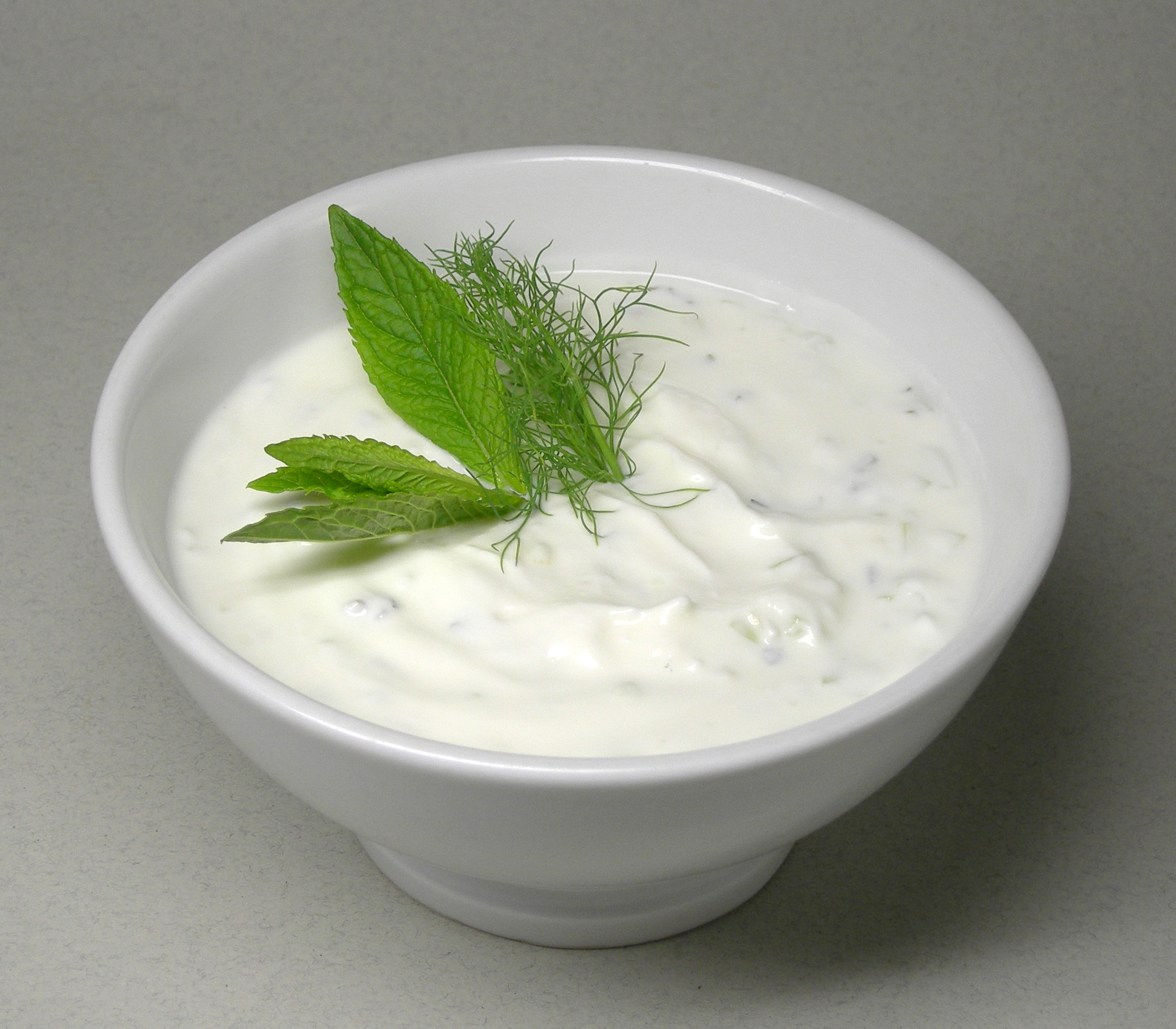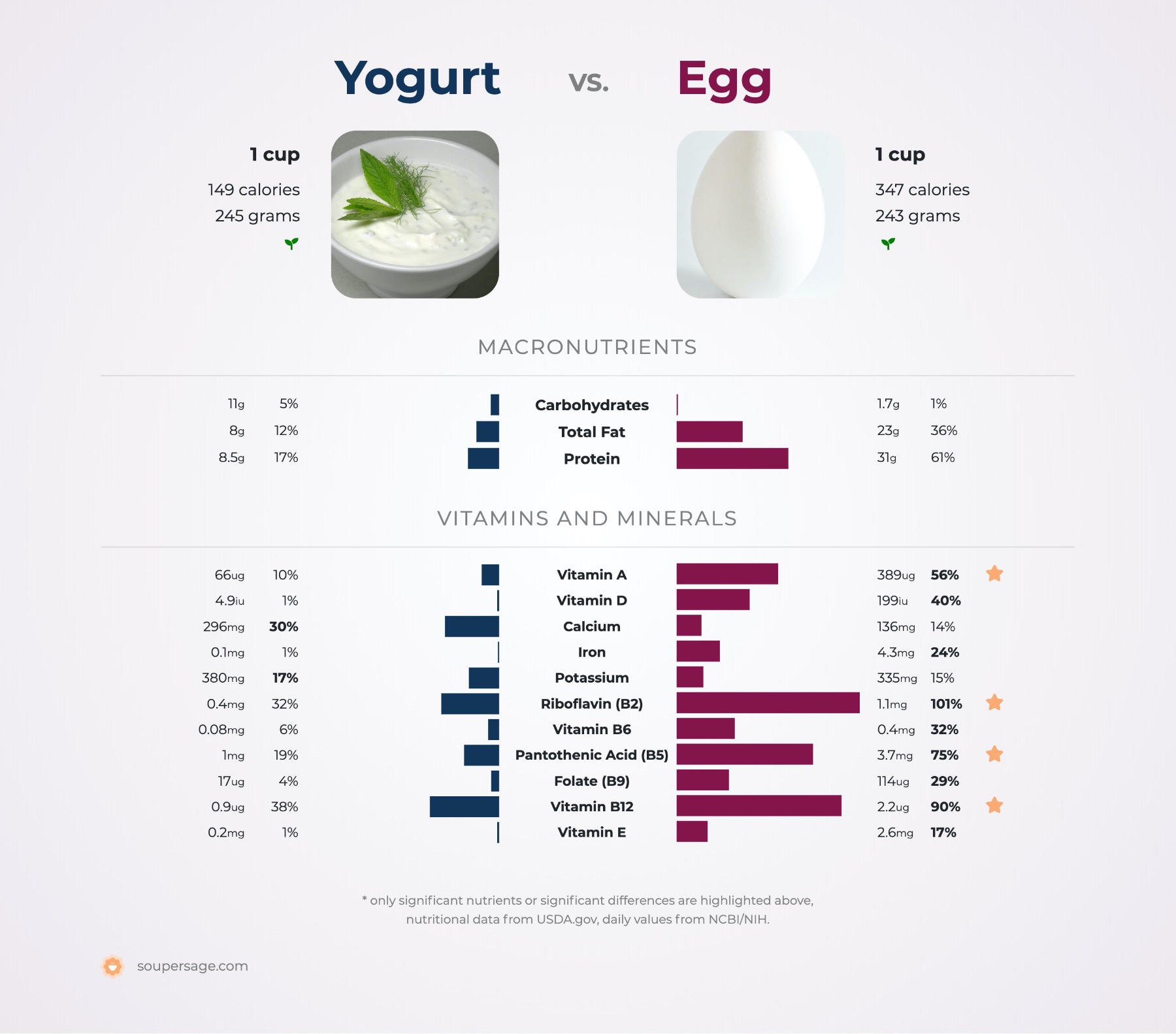Egg vs. Yogurt
Nutrition comparison of Egg and Yogurt
Ever wonder how your favorite foods stack up against each other in terms of nutrition?
We compared the nutritional contents of
egg
versus
yogurt
(100g each)
below using 2020 USDA and NIH data[1].
For a quick recap of significant nutrients and differences in egg and yogurt:
- Both yogurt and egg are high in calcium.
- Egg has 11.5 times less sugar than yogurt.
- Egg has more riboflavin, pantothenic acid, Vitamin B6, folate and Vitamin B12.
- Egg has signficantly more iron than yogurt.
- Egg is a great source of Vitamin D.
- Egg is an excellent source of Vitamin A and protein.
- For omega-3 fatty acids, egg has more dha than yogurt.
USDA sources for nutritional information: Egg (Egg, whole, raw, fresh) and Yogurt (Yogurt, plain, whole milk) . Have a correction or suggestions? Shoot us an email.
Calories and Carbs
calories
Egg is high in calories and yogurt has 57% less calories than egg - yogurt has 61 calories per 100 grams and egg has 143 calories.
For macronutrient ratios, egg is heavier in protein, much lighter in carbs and heavier in fat compared to yogurt per calorie. Egg has a macronutrient ratio of 36:2:62 and for yogurt, 22:30:48 for protein, carbohydrates and fat from calories.
Macro Ratios from Calories:
| Egg | Yogurt | |
|---|---|---|
| Protein | 36% | 22% |
| Carbohydrates | 2% | 30% |
| Fat | 62% | 48% |
| Alcohol | ~ | ~ |
carbohydrates
Both yogurt and egg are low in carbohydrates - yogurt has 4.7g of total carbs per 100 grams and egg has 0.72g of carbohydrates.
The carbs in yogurt and egg are both made of 100% sugar.
sugar
Egg has 11.5 times less sugar than yogurt - yogurt has 4.7g of sugar per 100 grams and egg has 0.37g of sugar.
Protein
protein
Egg is an excellent source of protein and it has 262% more protein than yogurt - yogurt has 3.5g of protein per 100 grams and egg has 12.6g of protein.
Fat
saturated fat
Yogurt has 33% less saturated fat than egg - yogurt has 2.1g of saturated fat per 100 grams and egg has 3.1g of saturated fat.
trans fat
Both egg and yogurt are low in trans fat - egg has 0.04g of trans fat per 100 grams and yogurt does not contain significant amounts.
cholesterol
Egg is high in cholesterol and yogurt has 97% less cholesterol than egg - yogurt has 13mg of cholesterol per 100 grams and egg has 372mg of cholesterol.
Vitamins
Vitamin C
Yogurt and egg contain similar amounts of Vitamin C - yogurt has 0.5mg of Vitamin C per 100 grams and egg does not contain significant amounts.
Vitamin A
Egg is an excellent source of Vitamin A and it has 493% more Vitamin A than yogurt - yogurt has 27ug of Vitamin A per 100 grams and egg has 160ug of Vitamin A.
Vitamin D
Egg is a great source of Vitamin D and it has 40 times more Vitamin D than yogurt - yogurt has 2iu of Vitamin D per 100 grams and egg has 82iu of Vitamin D.
Vitamin E
Yogurt and egg contain similar amounts of Vitamin E - yogurt has 0.06mg of Vitamin E per 100 grams and egg has 1.1mg of Vitamin E.
Vitamin K
Yogurt and egg contain similar amounts of Vitamin K - yogurt has 0.2ug of Vitamin K per 100 grams and egg has 0.3ug of Vitamin K.
The B Vitamins
Egg has more riboflavin, pantothenic acid, Vitamin B6, folate and Vitamin B12. Both egg and yogurt contain significant amounts of thiamin and niacin.
| Egg | Yogurt | |
|---|---|---|
| Thiamin | 0.04 MG | 0.029 MG |
| Riboflavin | 0.457 MG | 0.142 MG |
| Niacin | 0.075 MG | 0.075 MG |
| Pantothenic acid | 1.533 MG | 0.389 MG |
| Vitamin B6 | 0.17 MG | 0.032 MG |
| Folate | 47 UG | 7 UG |
| Vitamin B12 | 0.89 UG | 0.37 UG |
Minerals
calcium
Both yogurt and egg are high in calcium. Yogurt has 116% more calcium than egg - yogurt has 121mg of calcium per 100 grams and egg has 56mg of calcium.
iron
Egg has signficantly more iron than yogurt - yogurt has 0.05mg of iron per 100 grams and egg has 1.8mg of iron.
potassium
Yogurt and egg contain similar amounts of potassium - yogurt has 155mg of potassium per 100 grams and egg has 138mg of potassium.
Antioxidants and Phytonutrients
Omega-3 and Omega-6
omega 3s
For omega-3 fatty acids, egg has more DHA than yogurt per 100 grams. Both egg and yogurt contain significant amounts of alpha linoleic acid (ALA).
| Egg | Yogurt | |
|---|---|---|
| alpha linoleic acid | 0.048 G | 0.027 G |
| DHA | 0.058 G | ~ |
| DPA | 0.007 G | ~ |
| Total | 0.113 G | 0.027 G |
omega 6s
Comparing omega-6 fatty acids, egg has more linoleic acid than yogurt per 100 grams.
| Egg | Yogurt | |
|---|---|---|
| other omega 6 | 0.022 G | ~ |
| linoleic acid | 1.555 G | 0.065 G |
| Total | 1.577 G | 0.065 G |
Customize your serving size
The comparison below is by common portions, e.g. cups, packages. You can also see a more concrete comparison by weight at equal weight (by grams) comparison.
Egg g
()
|
Daily Values (%) |
Yogurt g
()
|
|||||
|---|---|---|---|---|---|---|---|
| KCAL % |
|
5% | calories | 5% |
|
KCAL % | |
| G % |
|
5% | carbohydrates | 5% |
|
G % | |
| G % |
|
5% | dietary fiber | 5% |
|
G % | |
| G | 5% | sugar | 5% | G | |||
| G % |
|
5% | total fat | 5% |
|
G % | |
| G % |
|
5% | saturated fat | 5% |
|
G % | |
| G | 5% | monounsaturated fat | 5% | G | |||
| G | 5% | polyunsaturated fat | 5% | G | |||
| G | 5% | trans fat | 5% | G | |||
| MG | 5% | cholesterol | 5% | MG | |||
| MG % |
|
5% | sodium | 5% |
|
MG % | |
| 5% | Vitamins and Minerals | 5% | |||||
| UG % |
|
5% | Vitamin A | 5% |
|
UG % | |
| MG % |
|
5% | Vitamin C | 5% |
|
MG % | |
| IU % |
|
5% | Vitamin D | 5% |
|
IU % | |
| MG % |
|
5% | calcium | 5% |
|
MG % | |
| MG % |
|
5% | iron | 5% |
|
MG % | |
| MG % |
|
5% | magnesium | 5% |
|
MG % | |
| MG % |
|
5% | potassium | 5% |
|
MG % | |
| MG % |
|
5% | thiamin (Vit B1) | 5% |
|
MG % | |
| MG % |
|
5% | riboflavin (Vit B2) | 5% |
|
MG % | |
| MG % |
|
5% | niacin (Vit B3) | 5% |
|
MG % | |
| MG % |
|
5% | Vitamin B6 | 5% |
|
MG % | |
| MG % |
|
5% | pantothenic acid (Vit B5) | 5% |
|
MG % | |
| UG % |
|
5% | folate (Vit B9) | 5% |
|
UG % | |
| UG % |
|
5% | Vitamin B12 | 5% |
|
UG % | |
| MG % |
|
5% | Vitamin E | 5% |
|
MG % | |
| UG % |
|
5% | Vitamin K | 5% |
|
UG % | |
| G % |
|
5% | protein | 5% |
|
G % | |
| UG % |
|
5% | biotin (Vit B7) | 5% |
|
UG % | |
| MG % |
|
5% | choline | 5% |
|
MG % | |
| MG % |
|
5% | chlorine | 5% |
|
MG % | |
| UG % |
|
5% | chromium | 5% |
|
UG % | |
| MG % |
|
5% | copper | 5% |
|
MG % | |
| UG % |
|
5% | fluoride | 5% |
|
UG % | |
| UG % |
|
5% | iodine | 5% |
|
UG % | |
| MG % |
|
5% | manganese | 5% |
|
MG % | |
| UG % |
|
5% | molybdenum | 5% |
|
UG % | |
| MG % |
|
5% | phosphorus | 5% |
|
MG % | |
| UG % |
|
5% | selenium | 5% |
|
UG % | |
| MG % |
|
5% | zinc | 5% |
|
MG % | |
| G | 5% | Water | 5% | G | |||
| G | 5% | Starch | 5% | G | |||
| G | 5% | Alcohol | 5% | G | |||
FAQ
Does yogurt or egg contain more calories in 100 grams?Egg is high in calories and yogurt has 60% less calories than egg - yogurt has 61 calories in 100g and egg has 143 calories.
Is yogurt or egg better for protein?
Egg is a fantastic source of protein and it has 260% more protein than yogurt - yogurt has 3.5g of protein per 100 grams and egg has 12.6g of protein.
Does yogurt or egg contain more calcium?
Both yogurt and egg are high in calcium. Yogurt has 120% more calcium than egg - yogurt has 121mg of calcium in 100 grams and egg has 56mg of calcium.


